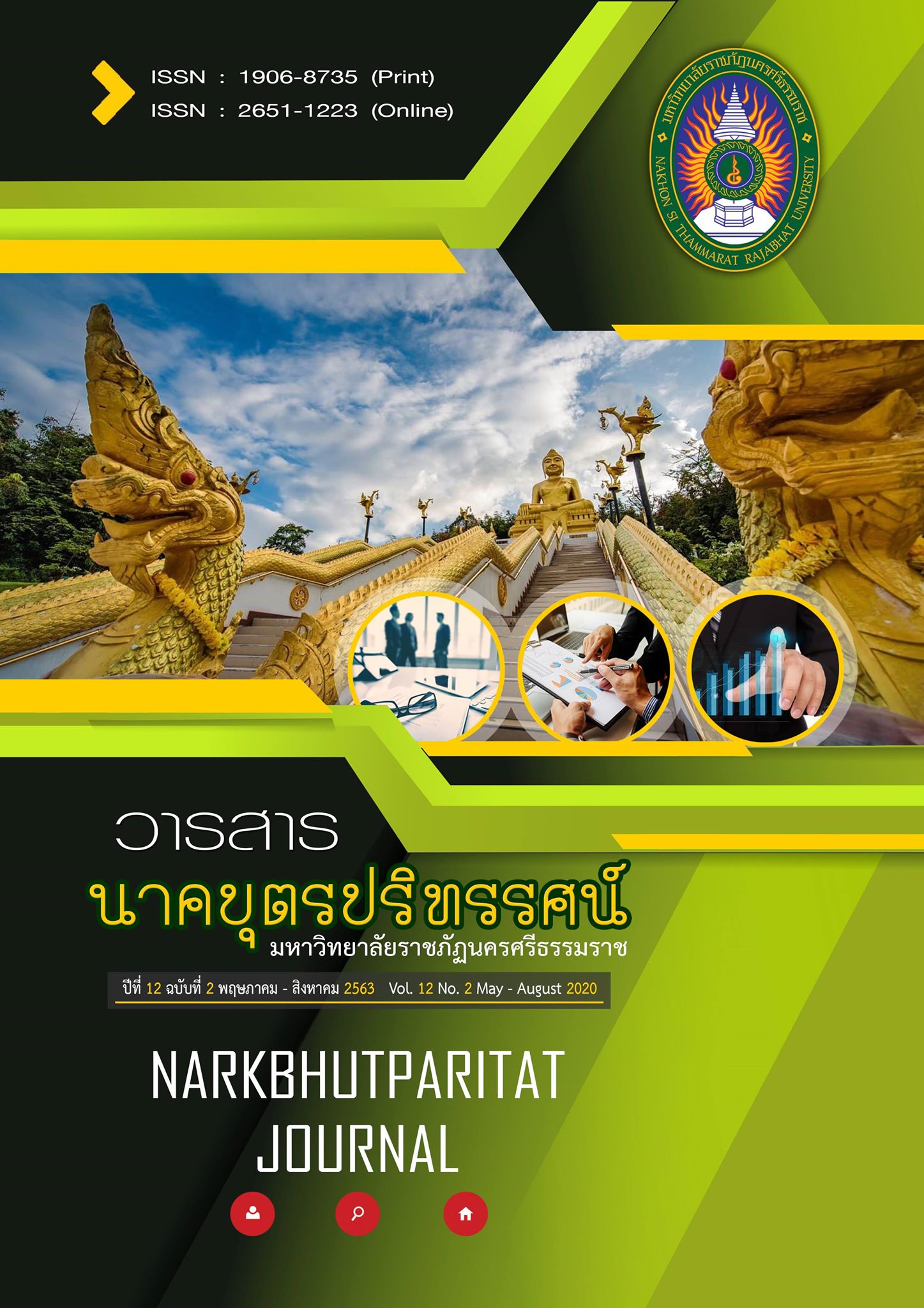การศึกษาเพื่อสร้างทฤษฏีฐานราก: ภาวะผู้นำสถานศึกษา ของผู้อำนวยการโรงเรียนดีเด่นในพระราชอาณาจักรกัมพูชาA Grounded Theory Study: School Leadership of Outstanding Schools Principals in Cambodia การศึกษาเพื่อสร้างทฤษฎีฐานราก: ภาวะผู้นำสถานศึกษา ของผู้อำนวยการโรงเรียนดีเด่นในพระราชอาณาจักรกัมพูชา
Main Article Content
บทคัดย่อ
การวิจัยครั้งนี้มีวัตถุประสงค์ เพื่อนำเสนอทฤษฎีภาวะผู้นำสถานศึกษาของผู้อำนวยการโรงเรียนดีเด่นในพระราชอาณาจักรกัมพูชา โดยทำความเข้าใจประเด็นคือ ลักษณะ เงื่อนไขการเกิด การปฏิบัติ ปัจจัยที่ส่งผลต่อการปฏิบัติ และผลที่สืบเนื่องจากภาวะผู้นำสถานศึกษาของผู้อำนวยการโรงเรียนดีเด่น โดยแสดงถึงวิถีทางที่เป็นเอกลักษณ์เฉพาะของผู้บริหารโรงเรียนที่ได้สร้างขึ้นจากภาวะผู้นำและเป็นอัตลักษณ์ทางการบริหารของตนเอง การวิจัยนี้ใช้วิธีการที่หลากหลายในการเก็บรวบรวมข้อมูลได้แก่ การสัมภาษณ์เชิงลึก การสังเกตแบบมีส่วนร่วม การสนทนากลุ่มย่อย ที่มีลักษณะเป็นข้อมูลเชิงบรรยาย โดยบรรยายเกี่ยวกับเหตุการณ์จริงที่เกิดขึ้นในบริหาร พฤติกรรมและกระบวนการทำงานที่สอดคล้องกับภาวะผู้นำสถานศึกษา ประสบการณ์ของบุคลากรและผู้เกี่ยวข้อง ที่มีความสอดคล้องกับประเด็นทฤษฎี ซึ่งจะช่วยให้ผู้วิจัยสามารถตีความหมายของสิ่งที่เกิดขึ้น และเชื่อมโยงไปสู่การสังเคราะห์เพื่อสรุปทฤษฎี กลุ่มเป้าหมายหลักในการเก็บข้อมูลประกอบด้วยผู้บริหาร บุคลากรภายในโรงเรียน นักเรียนและผู้มีส่วนเกี่ยวข้อง การเก็บรวบรวมและวิเคราะห์ข้อมูลโดยโปรแกรมคอมพิวเตอร์สำเร็จรูป
ผลการวิจัยพบว่า 1) ลักษณะภาวะผู้นำสถานศึกษาของผู้อำนวยการโรงเรียนดีเด่นในพระราชอาณา จักรกัมพูชา คือภาพหลักของการปฏิบัติที่สร้างขึ้นเพื่อใช้ในการบริหารงานโรงเรียนของตนอย่างเป็นเอกลักษณ์ ซึ่งมีองค์ประกอบสำคัญคือ เป็นวิธีการบริหารจัดการ ซึ่งมีหลายๆ ศาสตร์ทางการบริหารมาเกี่ยวข้อง และเกี่ยวข้องกับความเป็นเอกัตตบุคคลซึ่งเป็นอัตตลักษณ์ของภาวะผู้นำสถานศึกษาของผู้อำนวยการโรงเรียนเกิดขึ้นจากปรากฏการณ์ทางการบริหารที่ผู้อำนวยการโรงเรียนสร้างขึ้นผสานกับวิถีการทำงานหรือวัฒนธรรมโรงเรียนปรากฏออกมา การคงอยู่ของภาวะผู้นำ ขึ้นอยู่กับความยึดมั่นในอุดมการณ์ทางการบริหารของผู้อำนวยการโรงเรียน การเรียนรู้และพัฒนาตนเอง และความสอดคล้องระหว่างภาวะผู้นำสถานศึกษากับวัฒนธรรมโรงเรียน 2) เงื่อนไขการเกิดภาวะผู้นำสถานศึกษาของผู้อำนวยการโรงเรียน ได้แก่ภูมิหลังส่วนบุคคล แรงบันดาลใจในตนเอง แรงขับทางสังคม ความสัมพันธ์ และประสบการณ์ในการทำงาน 3) การปฏิบัติของภาวะผู้นำสถานศึกษาของผู้อำนวยการโรงเรียนดีเด่น ประกอบด้วย การทำงานมีเป้าประสงค์ การสร้างความสัมพันธ์ระหว่างบุคคล การใช้เครื่องมือทางการบริหารที่หลากลาย รวมทั้งการนำเทคนิควิธีการใหม่ๆเครืองมือในการสื่อสารมาใช้ในการบริหารงานโรงเรียน ส่วนปัจจัยที่ส่งผลต่อการปฏิบัติ ได้แก่ นโยบายและกฎหมาย ผู้บังคับบัญชาและต้นสังกัด ทีมงานผู้ใต้บังคับบัญชา ชุมชนและหน่วยงานที่เกี่ยวข้อง ทรัพยากรและงบประมาณ 4) ผลสืบเนื่องที่สำคัญปรากฏออกมาได้แก่ ผลที่ปรากฏโดยตรงต่อตัวผู้อำนวยการ ต่อนักเรียนและคุณภาพการศึกษา การยอมรับของชุมชนและสังคม รวมทั้งการสร้างองค์ความรู้ใหม่ทางวิชาการของการบริหารศึกษา
Article Details
เอกสารอ้างอิง
Bruce, E. (2010). Navigating: A Grounded Theory Study of How School Administrators
Prepare to Lead. (Dissertation Doctor of Education). Fielding Graduate University.
Available from: ProQuest LLC 789 East Eisenhower Parkway P.O. Box
UMI, Number: 3397537, 2010.
Chaturong, T. (2011). School Leadership of the Basic Education School’s Principals: The
Grounded Theory Study. (Dissertation Doctor of Philosophy in Educational
Administration). Khon Kaen University, Graduate School. (in Thai)
Hoy, W.K. and Miskel, C.G. (2001). Educational administration: Theory, research and practice
(9th ed). Boston: McGraw-Hill.
Kimcheang, H. (2015). An Implementation of Strategic Management System Plans of
Kampong Chheuteal High Chool under HER Royal Highness Princess
Maha Chakri Sirindhorn’s Sponsorship. (Dissertation Doctor of Philosophy in Educational Administration), Burapha University. (in Thai)
MoEYS. (2013). Policy on Teacher. Teacher Training Department, Ministry of Education Youth and Sports. Phnompenh. Cambodia.
________ . (2016). Education Congress. (The Education, Youth and Sport Performance in
the Academic Year 2014-2018 and Goal for the Academic Year 2015-2016). Phnom
Penh, Cambodia.
Soveacha, R. (2010). "Learning to Become Lifelong Global Citizens," Comparative and
International Education/Éducation Comparée et Internationale: Vol.39:
Iss.1,Article 6. Available at: http://ir.lib.uwo.ca/cie-eci/vol39/iss1/6
Saman, A. (2014). School Administration by the Modern Education Reform Guidelines (Revised
version). Faculty of Education Obon Rachathani Rajabhat University (2nd Ed.). Obon
Rachathani: Ubonkit Offset Printing. (in Thai)
Sarom, M. (2013). Perception on Cambodian High School Directors’ Leadership
Behaviors. (Doctoral Dissertation Program in Educational Administration).
Buriram Rajabhat University. (in Thai)
Strauss, A.L., and Corbin, J.M. (1998). Basics of Qualitative Research : Techniques and Procedures for Developing Grounded Theory (2nd ed.). California: SAGE Publications.
Tiwat, S. (2014). The School Administration to be a Quality School: The Grounded Theory
Approach. (Dissertation Doctor of Philosophy in Educational Administration).
Udon Thani Rajabhat University. (in Thai)
Teera, R. (2014). Professionalism in Educational Management and Administration: Education
Reform (Revised version) for the 2nd Round of Education Reform and 3rd Round of
Internal Assessment. (8th Ed.). Bangkok: Kaofang Printing. (in Thai)
UNESCO. (2014). Medium-Term Strategy 2014–2021: Laying Foundations for Equitable
Lifelong Learning for All. UNESCO Institute for Lifelong Learning. Feldbrunnenstraße
Hamburg. Germany.


